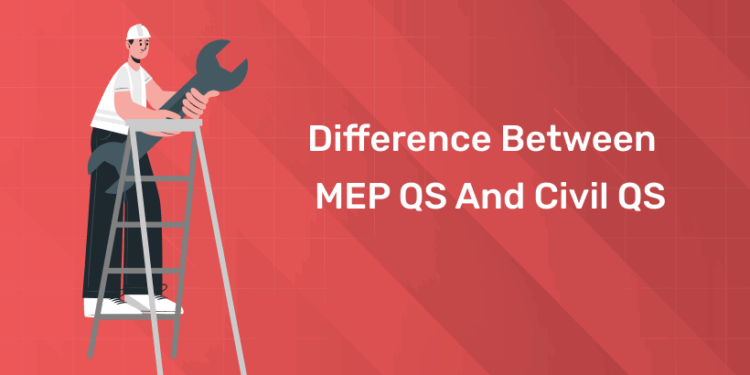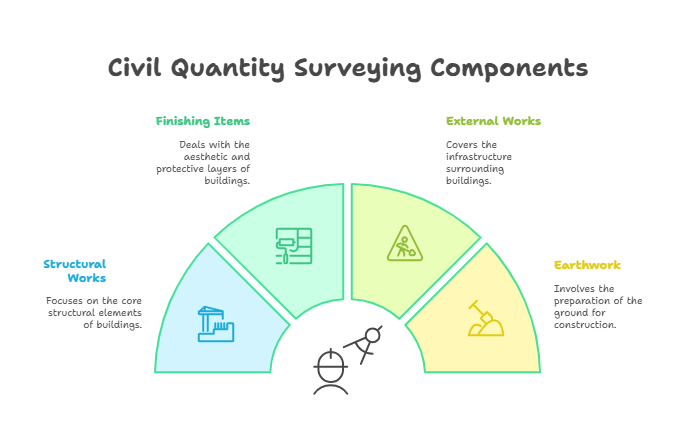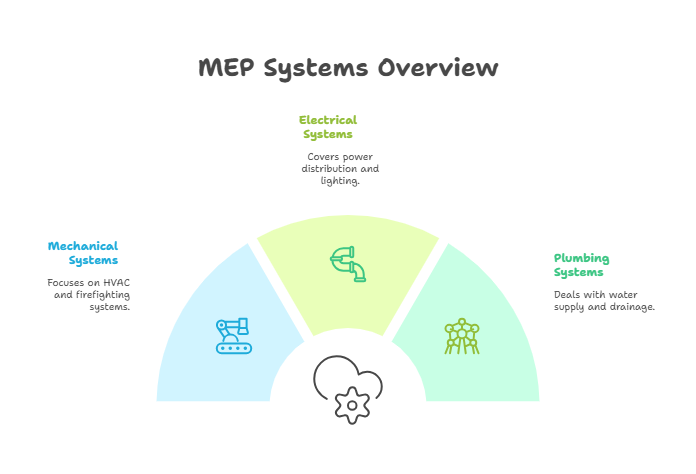Table of Contents
Are you confused between Civil QS and MEP QS roles? Both are important in the construction industry. But they focus on very different areas. Civil QS handles the building structure. MEP QS works on services like electrical, plumbing, and HVAC. Each role has its own tools, challenges, and career path. Knowing the difference can help you choose the right direction. This guide will explain the difference between MEP QS and Civil QS in simple terms.
If you are planning your career in Quantity Surveying, this is a must-read. You’ll learn how each role works in real projects. We’ll compare salaries, skills, and asoftware used. The goal is to help you make the right choice. Let’s get started.
Get Career oriented MEP training with Expert Mentors! Get Free Demo Here!
Difference Between MEP QS and Civil QS: Introduction
Quantity Surveying is a key part of every construction project. But not all QS professionals do the same job. There are different types of QS roles based on project needs. The two most common are Civil QS and MEP QS.
Knowing their differences can help you choose the right career path.
Why Understanding the Difference Matters
-
Better Career Planning
-
Helps you pick a role that suits your skills.
-
Avoids confusion during job search or interviews.
-
-
Focused Learning
-
You can learn the right tools and software for your role.
-
Saves time by skipping what you don’t need.
-
-
Improved Job Fit
-
Companies want specialized skills.
-
Choosing the right QS path makes you more employable.
-
Where Each Role Is Commonly Found
-
Civil QS
-
Building foundations and structures
-
Roads, bridges, and concrete works
-
-
MEP QS
-
High-rise buildings and malls
-
Hospitals, airports, and factories with complex services
-
What is Civil Quantity Surveying?
Civil Quantity Surveying deals with buildings and infrastructure. It focuses on structural elements and finishes. Civil QSs handle quantities, costing, and billing. They track budgets, prepare tenders, and manage site payments. Their work is key to keeping civil works on time and within cost.
Key Areas Covered in Civil Quantity Surveying
-
Structural Works
-
RCC, steel, formwork
-
Foundations, slabs, beams, columns
-
-
Finishing Items
-
Plastering, painting, tiles
-
Doors, windows, waterproofing
-
-
External Works
-
Roads, curbs, boundary walls
-
Site leveling, paving, drainage
-
-
Earthwork
-
Excavation and filling
-
Backfilling and compaction
-
Projects Handled by Civil QS
| Project Type | Civil QS Focus Areas |
|---|---|
| Homes and Apartments | Concrete, blockwork, tiles, plaster |
| Commercial Buildings | RCC frames, finishing, facades |
| Roads and Bridges | Earthwork, concrete paving, retaining walls |
| Industrial Projects | Structural steel, RCC slabs, foundations |
Who Can Become a Civil QS?
-
Civil engineering graduates or diploma holders
-
Site engineers wanting to move into QS roles
-
Anyone skilled in BOQs and rate analysis
-
Freshers with knowledge in drawings and estimation
Civil Quantity Surveyors are essential for managing costs in structural works. They support every phase, from drawing study to final billing. If you enjoy working with plans, numbers, and site work, this is a great career path to choose.
Master MEP Design with Industry-Leading Training!
Gain in-depth knowledge of Mechanical, Electrical, and Plumbing (MEP) Design with expert-led courses. Learn HVAC, fire safety, sustainable building strategies, and BIM applications to excel in the construction industry.
Know MoreWhat is MEP Quantity Surveying?
MEP Quantity Surveying deals with mechanical, electrical, and plumbing works. It focuses on all the services that make a building functional. MEP QSs estimate costs, prepare BOQs, and handle payments for MEP packages.
They work closely with engineers, vendors, and subcontractors. Their job is critical in modern, complex projects.
Key Areas Covered in MEP Quantity Surveying
-
Mechanical Systems
-
HVAC (Heating, Ventilation, Air Conditioning)
-
Firefighting systems, ducts, chillers, pumps
-
-
Electrical Systems
-
Cabling, lighting, switchboards, UPS, transformers
-
Power distribution and earthing systems
-
-
Plumbing Systems
-
Water supply, drainage, sanitary, stormwater
-
Pumps, valves, piping, tanks
-
Projects Handled by MEP QS
| Project Type | MEP QS Focus Areas |
|---|---|
| High-Rise Buildings | HVAC, electrical risers, water supply systems |
| Hospitals | Medical gas piping, backup power, sterile plumbing |
| Airports & Metro | Fire systems, complex ducting, power rooms |
| Data Centers | Cooling systems, UPS, heavy-duty electrical loads |
Who Can Become an MEP QS?
-
Mechanical, Electrical, or Plumbing engineers
-
Graduates in QS or Construction Management with MEP interest
-
Site engineers transitioning into commercial roles
-
Professionals familiar with MEP design and installation
MEP Quantity Surveyors play a key role in controlling the cost of building services. They work with dynamic teams and deal with both design and site challenges. If you enjoy working with systems, calculations, and coordination, MEP QS could be the perfect career for you.
Core Responsibilities: Civil QS vs MEP QS
Civil and MEP QS roles differ in scope and focus. Civil QSs handle building structure. MEP QSs manage the services inside the structure. Both roles support budget control and cost planning.
Responsibilities of a Civil QS
| Responsibility | What It Involves |
|---|---|
| BOQ Preparation | Based on civil and architectural drawings |
| Rate Analysis | Estimating labor, materials, machinery costs |
| Tendering & Contracts | Preparing bids and comparing contractor prices |
| Cost Monitoring | Tracking actual vs estimated expenses |
| Subcontract Billing | Checking claims from civil contractors |
| Site Measurement | Verifying completed work on-site |
| Progress Reporting | Weekly/monthly updates to the project team |
| Final Account Preparation | Settling costs after project completion |
Responsibilities of an MEP QS
| Responsibility | What It Involves |
|---|---|
| BOQ Preparation | Based on MEP drawings and specifications |
| Cost Estimation | Material, labor, and equipment pricing |
| Vendor and Subcontractor Billing | Verifying bills for MEP packages |
| Quantity Take-Off | From 2D or BIM-based MEP models |
| Contract Administration | Tracking variations, claims, and approvals |
| Site Measurement | Checking completed service installations |
| Progress Tracking | Linking cost with site progress reports |
| Testing & Handover Support | Verifying scope before project close-out |
Comparison Table
| Task | Civil QS | MEP QS |
|---|---|---|
| BOQs | Concrete, steel, finishing | HVAC, electrical, plumbing |
| Measurements | Slabs, beams, external works | Pipes, ducts, cabling |
| Coordination | With site/civil engineers | With MEP engineers and subcontractors |
| Billing | Civil contractors | MEP subcontractors |
| Final Account | Civil scope | MEP scope with testing/handover |
Tools and Software Used in Each Role
Each role uses tools suited to its scope. Civil QSs work with 2D drawings and Excel. MEP QSs often use BIM tools and digital take-off software. Software proficiency is key to efficiency.
-
AutoCAD – for reading 2D drawings
-
MS Excel – for quantities and billing
-
Candy / Buildsoft – for cost estimation
-
Primavera / MS Project – for tracking costs vs time
-
AutoCAD MEP – for 2D drawing analysis
-
Revit – for 3D BIM take-offs and modeling
-
CostX / Bluebeam – for digital quantity take-off
-
MS Excel – for BOQ, billing, and reconciliation
-
Navisworks – for coordination and clash detection
Master MEP Design with Industry-Leading Training!
Gain in-depth knowledge of Mechanical, Electrical, and Plumbing (MEP) Design with expert-led courses. Learn HVAC, fire safety, sustainable building strategies, and BIM applications to excel in the construction industry.
Know MoreProject Stages Involved: Civil vs MEP QS
Both roles span all project stages but with different focuses. Civil QSs start earlier in the design phase. MEP QSs join after services are planned. Both stay involved until project handover.
Typical Workflow of a Civil QS
-
Before Construction
-
Study drawings
-
Calculate quantities
-
Set budgets
-
-
During Construction
-
Measure site work
-
Update running bills
-
Approve payments
-
-
After Completion
-
Final quantity checks
-
Prepare closing documents
-
Assist with handover
-
Typical Workflow of an MEP QS
-
Design Stage
-
Study MEP layouts
-
Prepare BOQs
-
Estimate costs
-
-
Execution Stage
-
Measure installed services
-
Process running bills
-
Track variations
-
-
Completion Stage
-
Support testing and commissioning
-
Check as-built quantities
-
Assist in final billing
-
Get Career oriented MEP training with Expert Mentors! Get Free Demo Here!
Salary Comparison: Civil QS vs MEP QS
MEP QS roles generally pay slightly more. This is due to technical complexity and fewer skilled professionals. However, salaries also depend on location and experience.
Salary Comparison Table
| Country | Civil QS (Monthly) | MEP QS (Monthly) |
|---|---|---|
| UAE | USD 3,500 – 5,500 | USD 4,000 – 6,000 |
| UK | USD 4,500 – 6,500 | USD 5,000 – 7,000 |
| Singapore | USD 4,000 – 5,500 | USD 4,500 – 6,000 |
| India | ₹5–7 LPA | ₹6–9 LPA |
| Australia | USD 5,000 – 7,000 | USD 5,500 – 7,500 |
Skillset & Educational Background Required
Both roles need strong math, attention to detail, and site knowledge. Their educational path may vary based on specialization.
Civil QS Requirements
-
Civil Engineering or Construction Management degree
-
Site execution knowledge
-
Excel, AutoCAD, rate analysis
MEP QS Requirements
-
Mechanical/Electrical/Plumbing background
-
BOQ preparation for MEP services
-
Skilled in Revit, CostX, and estimation tools
-
Strong in measurements and calculations
-
Can read and understand drawings
-
Knows civil materials and standards
-
Good with reports and Excel sheets
-
Understands contracts and billing steps
-
Strong technical knowledge of MEP systems
-
Can read and interpret MEP schematics
-
Skilled in BOQ, take-offs, and billing
-
Proficient in software like Revit, CostX, Excel
-
Understands site execution and commissioning processes
Career Scope: Which One Should You Choose?
Both Civil and MEP QS roles have strong job prospects.
Your choice should depend on your interest and background.
Choose Civil QS If:
-
You enjoy structural works and site coordination
-
You have a civil engineering background
-
You want to work on roads, buildings, or bridges
Choose MEP QS If:
-
You enjoy service systems and technical planning
-
You come from MEP engineering
-
You want to work on smart buildings or large complexes
Course Recommendations
Short-term courses help boost your career in both fields. You can learn software tools, billing processes, and international standards.
For Civil QS:
-
Civil Quantity Surveying with AutoCAD & Excel
-
BOQ & Estimation for Infrastructure Projects
-
Construction Contract Management (FIDIC)
For MEP QS:
-
MEP Quantity Surveying with Revit & CostX
-
HVAC, Electrical, Plumbing Estimation
-
BIM for MEP Coordination
-
International Billing & Cost Control
Conclusion
Civil and MEP QS roles are both essential in construction. Civil QS focuses on structure; MEP QS handles services. MEP QS often earns slightly more due to complexity. Your choice depends on your skills and interest. Both offer strong job scope with the right training.
Key Takeaways
-
Civil QS = structure, finishes, and site development
-
MEP QS = HVAC, electrical, plumbing, and services
-
MEP roles use more technical tools like Revit, CostX
-
Both roles require BOQ, billing, and contract skills
-
Choose based on your background and career goals
Master MEP Design with Industry-Leading Training!
Gain in-depth knowledge of Mechanical, Electrical, and Plumbing (MEP) Design with expert-led courses. Learn HVAC, fire safety, sustainable building strategies, and BIM applications to excel in the construction industry.
Know MoreFrequently Asked Questions
What is the main difference between a Civil QS and an MEP QS?
The core difference lies in their focus areas. A Civil Quantity Surveyor manages the cost of structural and architectural works like concrete, steel, and finishes. In contrast, an MEP Quantity Surveyor handles mechanical, electrical, and plumbing systems such as HVAC, lighting, and drainage. Both roles involve estimation, billing, and cost control. However, they require different technical knowledge, tools, and coordination teams.
Can a Civil Engineer become an MEP Quantity Surveyor?
Yes, a civil engineer can transition into an MEP QS role, but it requires additional learning. They must understand MEP systems like HVAC, electrical layouts, and plumbing networks. Gaining experience in MEP projects or working with MEP consultants helps. Learning tools like Revit, CostX, and Bluebeam is also important. With effort and training, a successful shift is achievable.
Which role pays more—Civil QS or MEP QS?
MEP Quantity Surveyors usually earn slightly more than Civil QSs. This is because MEP systems are more technical and need specialized knowledge. In countries like the UAE, Singapore, and the UK, MEP QS roles are better paid due to higher demand. Civil QS roles still offer stable and well-paying opportunities but face more competition. Salary also depends on project type and experience level.
What software should I learn as a Civil QS?
Civil QSs should start with AutoCAD and Excel for drawing analysis and billing. Estimation tools like Buildsoft or Candy are commonly used for tendering and budgeting. Scheduling software like MS Project or Primavera is also helpful for tracking project timelines and linking them to cost. Excel is widely used for preparing BOQs, bills, and payment tracking. Mastering these tools can improve speed, accuracy, and job readiness.
Is BIM important for MEP Quantity Surveying?
Yes, BIM (Building Information Modeling) is very important for MEP Quantity Surveyors. MEP systems are complex and often modeled in 3D to ensure coordination and clash-free designs. Tools like Revit and Navisworks are used for accurate quantity take-offs and service integration. BIM also supports faster estimation and better visualization of work progress. MEP QSs with BIM skills are in high demand across global projects.
Can I switch from Civil QS to MEP QS mid-career?
Switching from Civil QS to MEP QS is possible with proper upskilling. You need to learn how mechanical, electrical, and plumbing systems work in buildings. Gaining practical exposure on MEP-related projects helps bridge the gap. Learning estimation techniques, BOQ formats, and MEP software is also essential. With some effort, you can successfully transition and explore new job opportunities.
Which role has better future scope—Civil QS or MEP QS?
Both roles have strong futures, but MEP QS is growing faster due to smart building demands. Modern buildings require complex MEP systems, and skilled QSs are needed to manage costs. While Civil QS roles remain important, they face more competition in the job market. MEP QS roles are harder to fill, which increases their value. If you enjoy systems and technical detail, MEP offers better long-term growth.
What kind of projects do Civil and MEP QSs work on?
Civil QSs typically work on core structures—residential buildings, commercial towers, roads, and bridges. They handle all the structural and finishing costs. MEP QSs work in buildings with high service demands like hospitals, malls, metro stations, and data centers. They manage the cost of systems like air conditioning, plumbing, and power supply. On large projects, both roles are equally important and work together.
Do both Civil and MEP QS roles exist in the same project?
Yes, both roles often exist on the same project. The Civil QS focuses on structure and shell, while the MEP QS manages all service-related costs. They work alongside project managers, engineers, and subcontractors. While their scopes are different, coordination between them is essential. Good collaboration ensures the entire project stays on budget and schedule.
What courses can I take to specialize in Civil or MEP QS?
For Civil QS, courses in AutoCAD, rate analysis, Excel-based estimation, and contract management are useful. For MEP QS, short-term training in HVAC estimation, Revit, CostX, and MEP BOQ preparation is ideal. BIM coordination and international billing practices also help. Choose courses that match your career goals and current experience level. Online programs, certifications, and workshops can build your skill set quickly.













